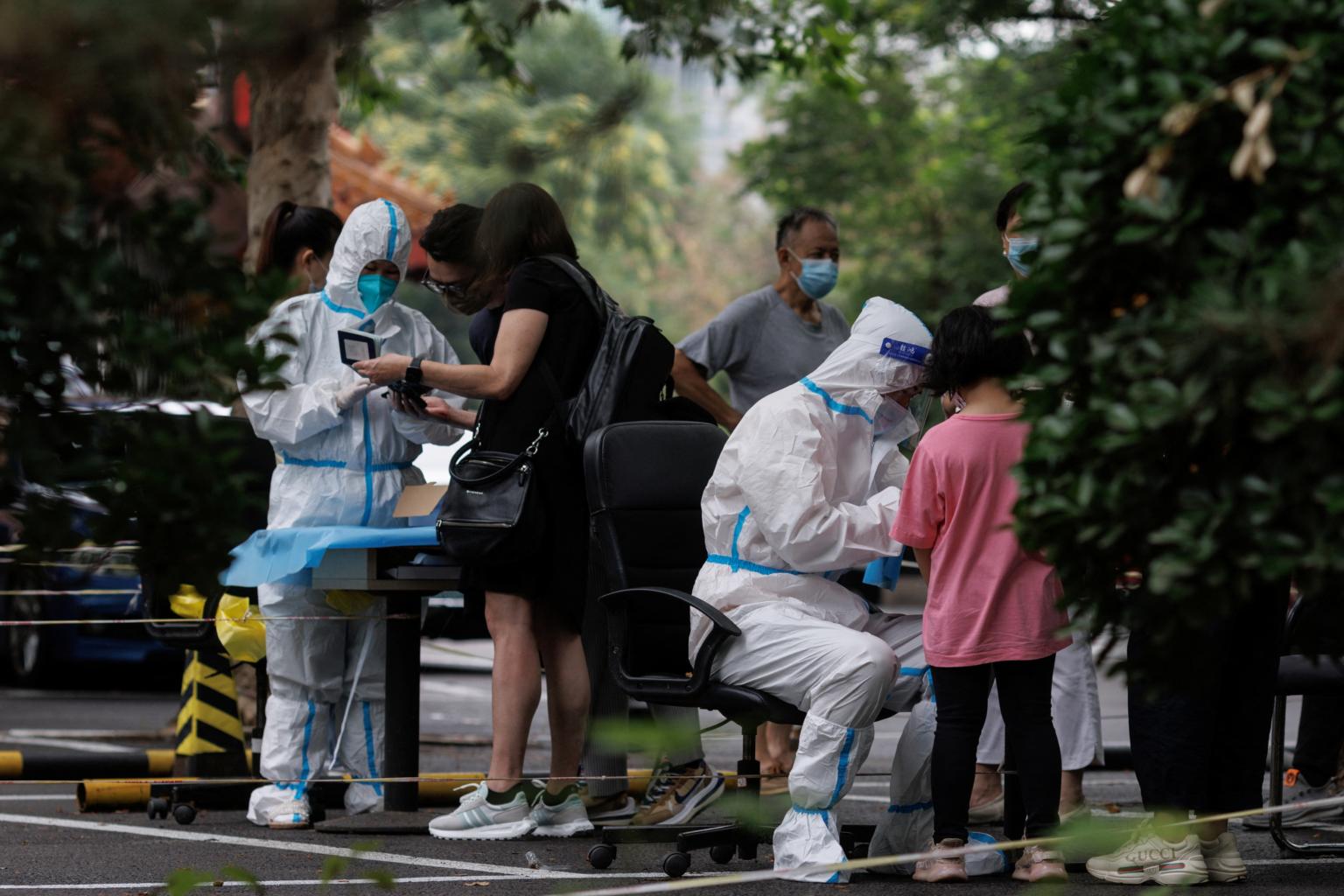Beijing city mandates Covid-19 vaccinations for some public places, relaxes curbs on domestic travellers
Sign up now: Get ST's newsletters delivered to your inbox

Beijing authorities said people wishing to enter venues such as libraries, cinemas and gyms would need to be vaccinated.
PHOTO: REUTERS
Follow topic:
BEIJING (REUTERS, AFP) - China’s capital on Wednesday (July 6) mandated Covid-19 vaccinations for most people to enter crowded venues such as libraries, cinemas and gyms, the first such move by Beijing which it coupled with a slight easing of domestic travel curbs.
Beijing’s measures came as tens of millions of people were under lockdown across China, and businesses in a major tourist city – Xi’an, home to the Terracotta army – were forced to close as fresh Covid-19 clusters sparked fears of wider restrictions.
From Monday (July 11), people in Beijing wanting to enter certain public would need to be vaccinated unless they have issues that render them unsuitable for jabs, a city official told a news briefing.
Restaurants and public transportation are exempt from the rule.
China as a whole has already required higher risk employees, such as those working in the public transport sector and cold-chain industry, to be vaccinated, though refrained from blanket mandates on the general public and stressed vaccination is voluntary.
Beijing city had fully inoculated 97.7 per cent of its adult population as of last September. It is now urging residents to get booster shots and trying to persuade the elderly, a group with lower vaccination rates than younger adults, to be vaccinated.
As of April 17, 80.6 per cent of those aged 60 and above in Beijing had received their first dose.
Elderly people who visit certain venues offering activities specifically for senior citizens should be vaccinated as soon as possible, said city health official Li Ang.
Hu Xijin, a prolific Chinese commentator and former editor in chief of the state-backed Global Times, said he hoped there could be a proper “grace period” for such impactful rules, though adding that the rule had a scientific basis.
Officials should take into consideration how to address the hesitancy among some groups, such as those who are preparing to have children and are worried that vaccination might affect the health of babies, Hu said.
Beijing has yet to specify details of the new mandate, such as whether it will just require an initial dose or a full vaccination or even booster, and whether it will recognise foreign vaccines such as those from Pfizer and Moderna that remain unapproved in China.
Beijing city reported three new local Covid-19 cases on Wednesday as of 3 pm, all of whom were already isolated for medical observation, following a total of nine infections earlier this month. Officials said on Wednesday that the BA.5.2 branch of the Omicron variant has been detected in the capital, but stressed the outbreak remains “controllable”.
The capital also finetuned its stringent rules on domestic travel. It would now “strictly restrict” entry by people who, within seven days, have travelled in towns that have recently reported one local infection or more, compared with 14 days earlier.
It also said on Wednesday that restrictions on entry by travellers from domestic areas near China’s international borders will be scrapped.
Direct international flights to Beijing will be resumed in an orderly way, the city said, without giving a timeline.
Chinese health authorities have reported more than 300 infections in the historic northern city of Xi’an and new clusters found in Shanghai and elsewhere.
In Shanghai, some social media users reported receiving government food rations – a throwback to the months-long confinement forced on the city’s residents earlier this year.
“I’m so nervous, the epidemic has destroyed my youth,” posted a Shanghai-based user on Weibo.
Officials launched a new round of mass testing in more than half of the city’s districts after a rebound in cases since the weekend. All karaoke bars were closed on Wednesday after some infections were found linked to six venues.
‘Temporary control’
Japanese bank Nomura has estimated that at least 114 million people were under full or partial lockdowns nationwide as of Monday, a sharp jump from last week’s 66.7 million.
In Xi’an – a city of 13 million that endured a month-long lockdown last year – the population was placed under “temporary control measures” after 29 infections were found since Saturday, mostly among recycling workers.
The city government said it will close entertainment venues including pubs, internet cafes and karaoke bars from midnight on Wednesday.
State media showed Xi’an residents queuing up for tests past midnight Tuesday but said the city was not under lockdown.
Officials have blamed the outbreak on a subvariant of Omicron, which is more transmissible and immune evasive.
“The positive infections are all the BA.5.2 branch of the Omicron variant, and epidemiological tracing work is still in full swing,” Xi’an health official Ma Chaofeng said at a briefing.
China’s biggest cluster is in the central province of Anhui, where more than 1,000 infections have been reported since last week.
Dozens of cases have also been recorded in Jiangsu province, neighbouring Shanghai, threatening the Yangtze Delta manufacturing region.
“A resurgence of Omicron is not an issue in most other countries, but it remains a predominant issue for the Chinese economy,” warned Ting Lu, Chief China Economist at Nomura.

